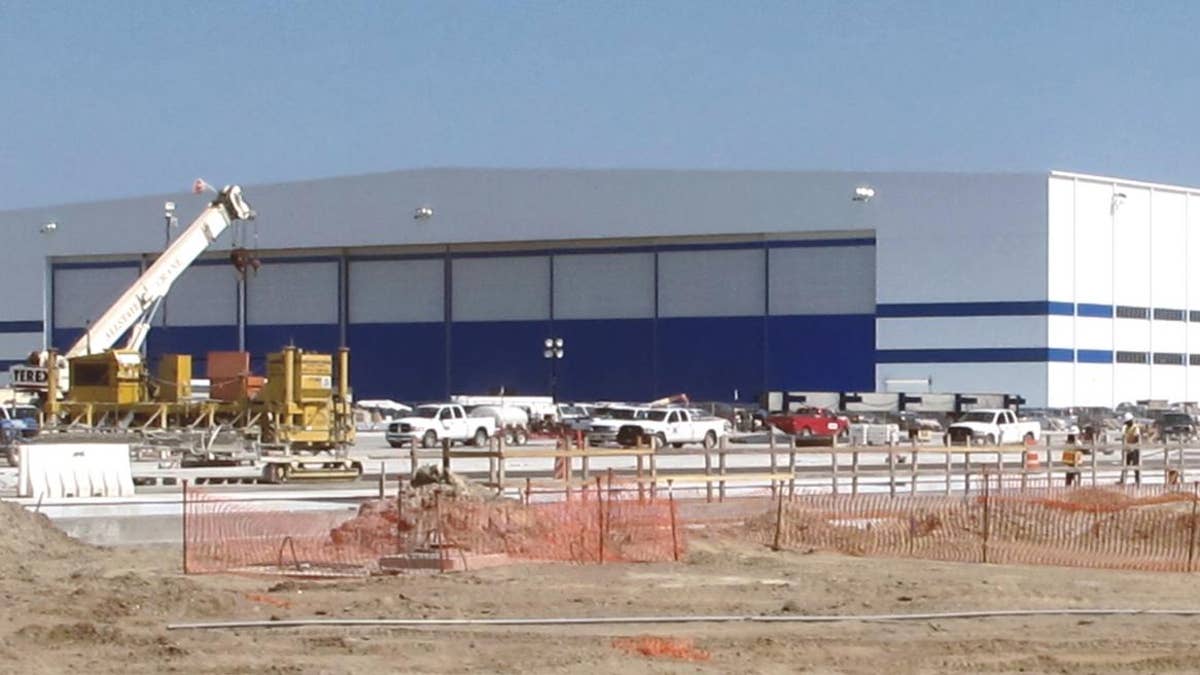
Work continues Tuesday, April 19, 2011, at the Boeing's new aircraft assembly site in North Charleston, S.C. (AP Photo/Bruce Smith)
Nearly three-quarters of eligible production workers at Boeing's South Carolina plant voted Wednesday not to join the International Association of Machinists in a major setback for organized labor.
The Post & Courier newspaper reported that 2,097 of 2,828 voting workers — 74.2 percent — cast ballots against unionization.
Under NLRB rules, workers must wait a year before another union vote. In a statement, Machinists organizer Mike Evans said the union was disappointed with the vote but vowed to stay in close touch with Boeing workers to figure out next steps.
"Ultimately it will be the workers who dictate what happens next," Evans said. "We've been fortunate enough to talk with hundreds of Boeing workers over the past few years. Nearly every one of them, whether they support the union or not, have improvements they want to see at Boeing. Frankly, they deserve better."
The vote took place ahead of a scheduled Friday visit by President Donald Trump to attend the rollout of the first Boeing 787-10 Dreamliner from the aircraft maker's North Charleston campus.
The vote was an uphill battle for the union and its backers. The global aviation giant, which came to South Carolina in part because of the state's minuscule union presence, did so with the aid of millions of dollars in state assistance made possible by officials who spoke out frequently and glowingly with anti-union messages.
"It is an economic development tool," then-South Carolina Gov. Nikki Haley, now President Donald Trump's ambassador to the United Nations, said in a 2012 address of how she sold companies on coming to the state. "We'll make the unions understand full well that they are not needed, not wanted and not welcome in the state of South Carolina."
Only about 52,000 South Carolina workers have union representation, according to the U.S. Bureau of Labor Statistics' 2016 figures. Other major manufacturers in the state, including BMW and Michelin, aren't unionized or haven't experienced major campaigns to do so. The Machinists initially petitioned for a vote at Boeing in 2015 but withdrew the request because of what the union claimed was a toxic atmosphere and political interference.
Southern states for decades have recruited manufacturers by promising freedom from the influences of labor unions, which except for some textile mills have been historically rejected by workers as collective action culturally foreign to a South built around family farms, said Jeffrey Hirsch, a law professor who specializes in labor relations at the University of North Carolina at Chapel Hill.
Boeing didn't threaten to move its operations abroad if workers unionized, perhaps abstaining from those threats because of its huge South Carolina plant investment and billions of dollars in federal defense contracts the company does not want to risk.
The union vote also came after Trump blasted Boeing for the cost of building a new Air Force One.
"Costs are out of control," Trump tweeted in early December. "Cancel order!"
Boeing CEO Dennis Muilenburg met with Trump two weeks later.
Catherine Templeton, South Carolina's former labor director and successful anti-union lawyer, is no stranger to this fight. When Haley picked Templeton to lead South Carolina's labor department, the governor played up Templeton's union-fighting background and saying she needed her help to "fight the unions" at Boeing.
"They cannot legally deliver higher wages, better benefits or a different working environment. Even if they are promising it, they certainly can't deliver it," Templeton said.
Asked earlier Wednesday about the vote, South Carolina Gov. Henry McMaster said he didn't feel unions were needed in the state.
"I think we're doing just fine without a union presence," he said.
In a statement emailed to reporters, Boeing vice president and general manager Joan Robinson-Berry was already looking toward Trump's visit, the first by a sitting president to the facility.
"It is great to have this vote behind us as we come together to celebrate that event," she said.
The Associated Press contributed to this report.





















